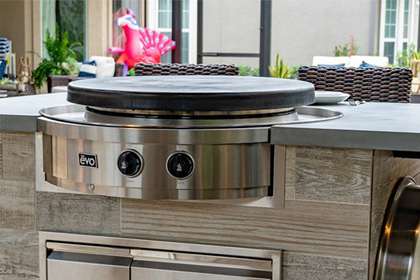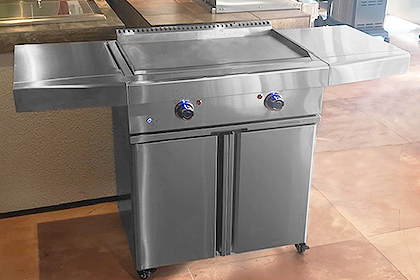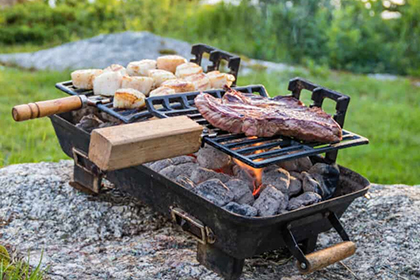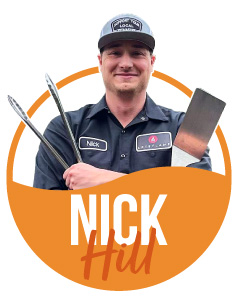What is a Hibachi Grill

Hibachi has evolved in both form and functionality. Despite its reputation as one of the high-end cooking techniques in fine dining Japanese food joints, hibachi’s origin and history are quite humble and slightly contradict the modern hibachi usage. Here is an in-depth guide about the hibachi grill and its transformation from simple household cookware to beautiful grills for impressive and entertaining grilling in major Japanese restaurants.
History of Hibachi Grill
The hibachi grill’s history dates back to the Heian period (794-1185 AD). In itself, hibachi can also trace its origin from the term “Teppanyaki”), equated loosely to ‘grilling over an iron plate’. Since metal was not a commonly found resource in early Japan, ancient hibachis were designed from a wood amalgam from cypress trees then further lined with clay.
With time, hibachis became a major part of many homes in various social classes, leading to a diversification in its functionality. For instance, besides heating, hibachi is used as portable stovetops, or cigarette lighters, especially in the cold months. As a result, hibachis became more popular during traditional Japanese celebrations such as outdoor winter events, festivities, and tea ceremonies.
Unfortunately, the transition of the hibachi from a heating device to a cooking tool is often disputed among scholars and culinary enthusiasts. On the one hand, evidence suggests that hibachi-style grill cooking started over 200 years ago in Japan. On the other hand, opposing parties argue that hibachi cooking started in the mid-1900s. Since hibachis were originally smaller, it is almost impossible for people to believe how they have transformed into the large devices common in most Japanese food establishments nowadays.
What does Hibachi Mean
Most people who attempt to define hibachi grill end up confusing or interchanging with Teppanyaki. Hibachi is a traditional Japanese charcoal-fueled cooking bowl with roots from as early as the 8th Century. A hibachi grill is typically considered a small portable charcoal grill. Slightly contrary to popular opinion, hibachi is currently used to mean flat top glass grills—often known as Teppanyaki grills, Planchas, or Gas Griddles.
Most people who attempt to define hibachi grill end up confusing or interchanging with Teppanyaki. Hibachi is a traditional Japanese charcoal-fueled cooking bowl with roots from as early as the 8th Century. A hibachi grill is typically considered a small portable charcoal grill. Slightly contrary to popular opinion, hibachi is currently used to mean flat top glass grills—often known as Teppanyaki grills, Planchas, or Gas Griddles.
The foods used in hibachi-style cooling vary, but popular choices include meats, rice, and vegetables as the main dishes. Hibachi’s food heating mechanism adds grilled flavor to the food
Types of Hibachi Grills
The foods used in hibachi-style cooling vary, but popular choices include meats, rice, and vegetables as the main dishes. Hibachi’s food heating mechanism adds grilled flavor to the food

Flat Top Grill & Gas Griddles
Ideal additions for outdoor cooking in an outdoor kitchen, flat top grills and gas griddles are perfect for any type of foods.
- Versatile cooking - gas griddles are capable of almost every cooking style
- Even, high heat – designed to spread heat evenly across its flat cooking surfaces
- Not too smoky–these grills channel drippings to an in-built pan, preventing smoky flare-ups
- Multi-Purpose cooking - griddles lets you cook multiple foods at the same time
- Healthy grilling – a flat-top doesn’t require much oil to cook. Natural fats will render and run off into the grease trap
- Strong Build and Durability - designed from high-quality stainless steel for extreme heat and corrosion resistance.

Teppanyaki Gas Grills
Perfect for cooking any amount of food, grill restaurant quality meals right to your home with your very own Teppanyaki Gas Grill.
- No dirt - The grill has a special removable drawer under the cooking plate that collects food grease, thus reducing unwanted staining
- Easy to clean – Most teppanyaki grills have easy to remove control panels, making cleaning easy and quick
- High temperatures – Teppanyaki grills allow you to grill foods at varying high temperatures from as low as 200°F to as high as 570°F.
- Adaptable heights – The teppanyaki grill has adaptable height due to its adjustable feet, allowing you to customize it to your preference.

Hibachi Charcoal Grills
The hibachi grill is perfect for picnics, outdoor camping, or any mobile events needing grills due to its size and portability.
- Storable and Compact - The hibachi charcoal grill is smaller than average, perfect for anyone with limited space.
- Perfectly Portable - Bundle it for outdoor adventures or install it on almost any part of your compound.
- Designed For Durability – A grill that can withstand the test of time, these grills are designed to last.
- Versatile - The Hibachi-style grill can be used to prepare a wide range of foods depending on your preference
- Highly fuel-efficient – This grill uses very low fuel, making it cost-effective and energy-friendly.
Bottom Line
Hibachi grills and teppanyaki grills are terms used interchangeably from time to time. However, a teppanyaki gas grill differs from the conventional hibachi charcoal grill and the flat top grill and gas griddles. These grills are common in Japanese restaurants across the world. The most common factor is the fact that all these grills allow for open and entertaining cooking.
Fortunately, you don’t need to go to Japanese-style restaurants to enjoy a hibachi-style dish. At Barbeques Galore, you can order a high-quality functional hibachi grill and start your way to grilling freedom. Browse our selection of top-quality grills to buy the most suitable hibachi grill for your indoor or outdoor grilling needs.







